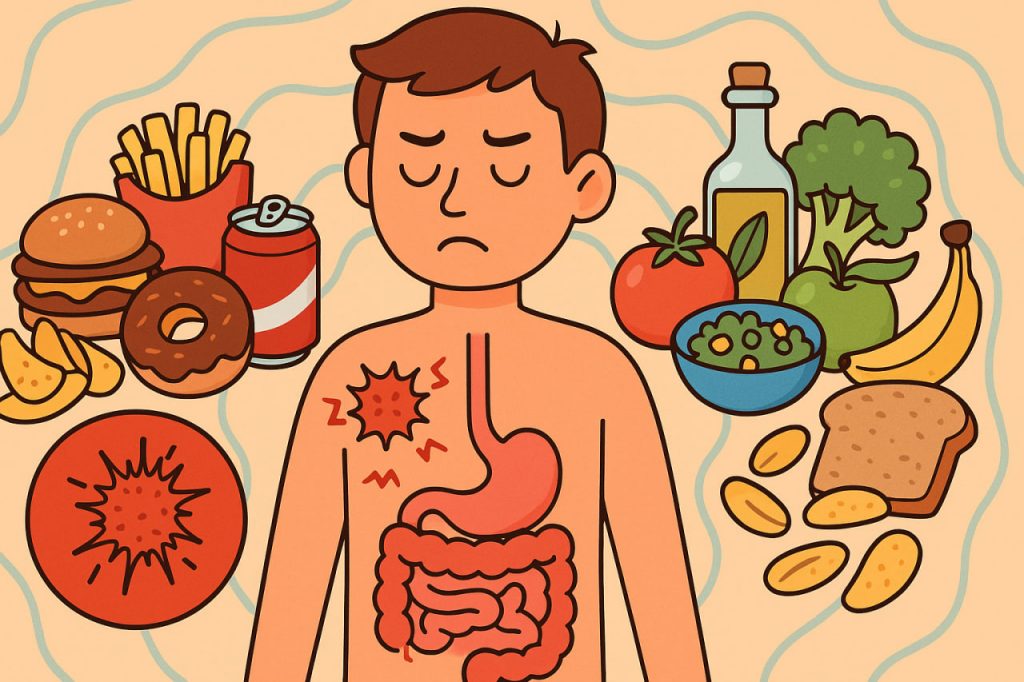Inflammation is a natural immune response to injury, infection, or harmful stimuli. While acute inflammation helps the body heal, chronic inflammation is associated with a range of diseases including cardiovascular disorders, diabetes, and autoimmune conditions. Diet plays a critical role in modulating inflammation by either promoting or suppressing inflammatory pathways. Understanding the relationship between food and the immune system allows for better prevention of disease and support of long-term health.
What Is Inflammation and Why It Matters
Inflammation is the body’s defense mechanism involving immune cells, cytokines, and biochemical mediators. It occurs in two main forms: acute, which resolves within days, and chronic, which can persist for months or years. Chronic inflammation is often subtle and symptomless but contributes to the progression of many non-communicable diseases.
The food we eat influences how immune cells behave and how signaling molecules are produced. Certain dietary patterns can reduce the production of pro-inflammatory cytokines, while others may enhance them. Thus, nutrition is not just fuel—it’s a tool that can influence immune balance.
Pro-Inflammatory Foods and Their Effects
Diets high in refined carbohydrates, trans fats, added sugars, and ultra-processed foods are associated with increased markers of inflammation. These include elevated levels of C-reactive protein (CRP), interleukin-6 (IL-6), and tumor necrosis factor-alpha (TNF-α).
Excessive intake of omega-6 fatty acids, found in many vegetable oils, without balancing omega-3 intake, may also promote inflammation. Processed meats, sugary drinks, and fried foods stimulate oxidative stress and disrupt the integrity of the gut barrier, allowing toxins to enter the bloodstream and trigger immune responses.
Anti-Inflammatory Foods and Nutrients
Certain foods possess anti-inflammatory properties due to their content of phytonutrients, antioxidants, and healthy fats. These include fruits, vegetables, whole grains, nuts, seeds, legumes, fatty fish, and olive oil.
Nutrients such as omega-3 fatty acids, polyphenols, vitamin C, vitamin D, and magnesium have been shown to reduce inflammation by lowering cytokine production and improving immune regulation. Fiber-rich foods support a healthy gut microbiota, which in turn reduces systemic inflammation through the production of short-chain fatty acids (SCFAs).
The Gut-Immune-Inflammation Axis
The gastrointestinal tract is a key regulator of inflammatory activity. The gut microbiota plays a central role in immune system training and anti-inflammatory signaling. A diet rich in fiber and fermented foods supports microbial diversity and intestinal integrity.
When the gut lining is compromised—often due to poor diet—it can lead to increased intestinal permeability, sometimes called “leaky gut.” This allows bacterial fragments to enter circulation and activate inflammatory pathways. Thus, maintaining a healthy gut environment is essential for inflammation control.
Dietary Patterns and Inflammatory Balance
Rather than focusing solely on individual nutrients, the overall dietary pattern is crucial. The Mediterranean diet, characterized by high consumption of plant foods, healthy fats, and minimal red meat, is consistently associated with lower inflammation.
In contrast, the Western diet, rich in refined grains, processed meats, and sweetened beverages, is linked to higher inflammation. Intermittent fasting and time-restricted eating have also shown potential in modulating inflammatory markers, though more research is needed to confirm long-term effects.
Conclusion
Nutrition significantly influences the body’s inflammatory status. While certain foods exacerbate immune activation, others help resolve it. By choosing nutrient-dense, whole foods and limiting processed, inflammatory ingredients, individuals can support immune balance, reduce disease risk, and improve overall health. The connection between diet and inflammation underscores the importance of daily dietary decisions in maintaining physiological harmony.
Glossary
- Inflammation — a biological response of the immune system to harmful stimuli.
- Cytokines — signaling proteins that regulate immune responses.
- C-reactive protein (CRP) — a marker of inflammation in the blood.
- Omega-3 fatty acids — essential fats with anti-inflammatory effects.
- Gut microbiota — the community of microorganisms living in the digestive tract.
- Short-chain fatty acids (SCFAs) — beneficial compounds produced by gut bacteria during fiber fermentation.
- Oxidative stress — cellular damage caused by reactive oxygen species.
- Leaky gut (increased intestinal permeability) — a condition in which the gut lining becomes compromised, allowing harmful substances into the bloodstream.


